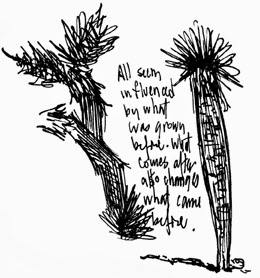(Didja know Dr. Seuss pronounced it "Soyce," by the way? Didja?)Everything comes tethered to memory. No less with this project for fellow facebook swimmer Inez Maurer from Down Under.
(Is "Down Under" considered pejorative to Australians, or at least tiresome, like calling California the land of fruits and nuts? [Ha ha! get it?] Then my sincere apologies.)Could I do something fairly quick, please, for her son's bicycle motocross team as it goes to the national meet? Inez asked.
I built a couple of bicyclists in Illustrator and then created a crowd of them flowing from the center by repeating their shapes in two fans. The resulting cascade forms an "S" for Sydney.
The frog in the "D" of Sydney and the randomly placed frog eyes refer to the green and golden bell frog of southeast Australia, a vulnerable species that makes a sort of anti-mascot for the club. It's not allowed to have lights at its track, to protect the frog, so it runs all its races in the heat of day.
The yellow circles hearken to the Sydney Olympic Park logo (a yellow circle from the Olympic rings!) where the club competes. The flying clumps are negative shapes from in between the clumps of riders.
That clump comes from visceral memory, when I was a kid and bicycle motocross was just beginning. It didn't have the cool BMX call letters, nor helmets, nor organizations, nor bikes designed for the sport. It comprised our re-fashioned Huffy™® Dragsters and Schwinn©® Sting-Rays — off went the sissy bars and banana seats, on went junk-yard 10-speed bike seats — and a field where grown-ups would let us alone.
The craze must have reached our out-of-the-way town somehow, because I remember somewhere in town we could buy the number plates to fasten with wires across our handlebars, and stickers promoting motocross bikes. We liked Bultaco©® and Husqvarna™™, just for the names.
Steve and Dave Marzio, two houses down the street, drove the craze in our neighborhood. They were the builders and tinkerers. They also rode the rise of skateboards, which coincided with severe drought and high property tax burdens in California, which caused homeowners to drain their swimming pools, inadvertently turning them into skate parks. The Marzios had a pool; as far as I know, it's been empty since.
Though the skateboard craze passed me by, a whiff of W-D 40®© always brings me right back to the Marzio's workshop in the front of their garage, where I passed many afternoons seeking counsel on the gloom of junior high.
Our neighbor Buddy Butler was the envy of the street with a Yamaha bike with front shocks and maybe even suspension beneath the seat. The Marzios helped me turn a Schwinn frame with solid chrome-plated forks (I may have gotten it from Buddy) into a passable bike. In short time we went down to race in the abandoned field.
My time there was short. Grownups had shown up, grouping kids into races. I found out the hard way in the first race that my front sprocket was too big to get me anywhere on the dirt track. The crowd of elbow-to-elbow bicyclists, the one that spurred this illustration, soon passed me by. I turned my budding career to trick jumping.
My grown-up self cannot believe what my kid self used to do, especially me, hardly the adventurous type. I would speed across the vast sloping parking lot of the Catholic Church eight doors down, aiming for a low corner curb of concrete sidewalk that encircled the Catholic school building. The parking lot against the sidewalk sloped sharply to a gutter, and a blob of tar had balled up right at the base of the curb, forming a perfect ramp. Beyond the corner was one of the roads leading into church property.
With enough speed, it was possible to leap from that curb, about five feet in the air and maybe 25 feet out. That big sprocket made my bike a rocket.
I did that over and over again, often by myself, not giving much thought that it was impossible to know whether a car — unlikely as it would be on a weekday — would be coming up the road on that blind corner, or whether a kid might be coming around on the sidewalk.
What cut short that career, though, was when I landed wrong on a jump and fell over the handlebars, draped helplessly as the bike somehow coasted across the road, into the woods and into a fence. I think I got rid of that bike. Loved those forks, though.
Hanging around Steve and Dave made me more confident, and I was able to do most of the work rebuilding yet another bike another neighbor gave me. I decided it would be the beast of the neighborhood, a beach cruiser before there were beach cruisers, a big 26-inch frame.
I stripped the frame and repainted it, brick red. I cleaned its parts (the Marzios probably directed this, because I was a dud with ball bearings and threaded pieces) and got new parts when I needed and when I could.
It was a true gem, wheels straight, slick and oiled and smooth and powerful — for one day.
The next day, riding it around the church parking lot, the bike broke in half with one hard pedal, right where the seat tube and down tube meet. The frame, having sat in a yard all those years, was rusted through and I found out too late. I walked the parts home and, for whatever reason, probably didn't ride a bike again until college.
Memories.


















